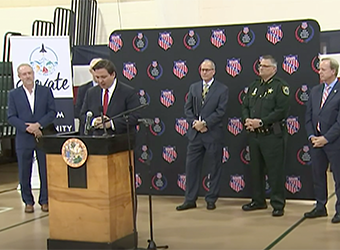
Gov. Ron DeSantis and Florida Department of Education Commissioner Richard Corcoran recently unveiled the roadmap to reopen Florida’s schools and distribute federal money from the CARES Act. Photo courtesy of The Florida Channel
This week, the Florida Department of Education (FDOE) released new information on how the state plans to support Florida students impacted by the COVID-19 pandemic. In a joint press conference with Governor Ron DeSantis, Florida Department of Education Commissioner Richard Corcoran unveiled the roadmap to reopen Florida’s schools and distribute federal money from the CARES Act. The plan emphasizes FDOE’s intention to use the CARES funding to support students most affected by COVID-19, particularly by addressing equity and achievement gaps across the state.
As the state moves into phase two implementation, several announcements from this week stand to impact Florida’s postsecondary students and support degree and credential completion.
Suspension of Bright Futures Scholarship Requirements
On June 10, Commissioner Corcoran signed an executive order to temporarily suspend Bright Futures Scholarship requirements that students are unable to fulfill due to COVID-19-related restrictions. The executive order extends the deadline for scholarship applicants to submit their ACT or SAT scores by one month, to July 31. Although there are no SAT testing dates scheduled during this extended grace period, students will have two opportunities to take the ACT before the new deadline.
Additionally, the order offers leniency to students who fell short of their volunteering requirements because of COVID-19-related shutdowns. School counselors, guidance counselors, or school administrators may submit transcript documentation stating the student’s intention to complete the required hours as evidence of the requirement’s completion. For students graduating high school in 2020, this documentation will be accepted to fulfill their volunteering requirement. This policy pertains to students applying for all Bright Futures Scholarship award levels, including Florida Gold Seal CAPE Scholars and the Florida Gold Seal Vocational Scholars.
Free SAT and ACT Testing ($8 million allocation)
Of the $770.25 million in federal funding for Florida’s K-12 school system, 90% must go directly to local education agencies. The FDOE used the remaining 10% to prioritize literacy programs and progress monitoring. Notably, $8 million from this funding will be used to provide free SAT and ACT testing to high school students during the 2020-21 school year. An estimated 200,000 students will receive a $40 voucher to cover the cost of their test.
Rapid Credentials ($35 million allocation)
Given the widespread impact of the pandemic on the labor market, the Governor and FDOE emphasized that Florida must take a cross-sector approach to identify new jobs, job functions, and rapid training programs to meet critical workforce demands. To support this effort, FDOE has allocated $35 million for “rapid credentialing” programs at Florida College System (FCS) institutions that can be completed in 18 weeks or less. The goal is to increase institutional capacity for short-term, in-demand technical and industry certifications that articulate into college credit (otherwise known as a stackable credential). The FDOE has already identified programs that meet their requirements for funding.
Pathway to Job Market Dashboard ($2.5 million allocation)
The FDOE will spend $2.5 million to further the Governor’s goal of becoming #1 in the nation in workforce education by 2030 through the development of an online data dashboard on Florida’s CTE program offerings. This dashboard, which has been a long-time priority for education and workforce advocates, would include data on all career and technical (CTE) programs and corresponding labor market data to provide a comprehensive picture of the labor market.
New CTE Equipment ($10.9 million allocation)
Nearly $11 million be will disbursed to Florida’s public K-12 schools and technical programs in the form of equipment grants to strengthen in-demand CTE programs. Each school district will receive a $55,000 base allotment to support CTE, earning an additional $10,000 for each school or technical college offering certain CTE programs.
Given the evolving situation around COVID-19 and the impacts on postsecondary education, FCAN will continue to update our COVID-19 resources page with new developments and information.
RELATED ARTICLES:
How the CARES Act can help Florida college students and education institutions
